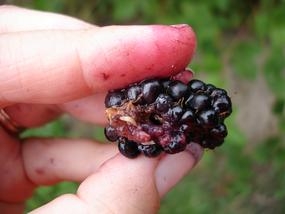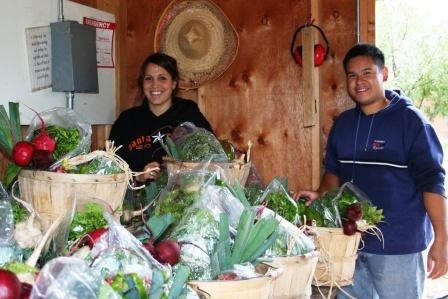Posts Tagged: Neal Van Alfen
Ag dean disputes notion that ag degrees are 'useless'
Dean of the UC Davis College of Agriculture and Environmental Sciences, Neal Van Alfen, said a recent Yahoo! story that suggested many ag degrees are "useless" does not reflect statistics accumulated by the university, according to an article by Tim Linden in Produce News Daily.
Van Alfen said graduates from ag sciences, physical sciences and math are tied at the top of the charts, with 88 percent reporting they are currently working in their field of choice. On the bottom end of the list are those with degrees in humanities, arts and cultural studies, with only 61 percent working in their field of choice.
Looking forward, an ag degree may even increase in value in the coming years as producing food in an efficient manner is going to be one of the bigger challenges facing the world, the Produce News article said. The world population is growing and more and more food will be consumed and will have to be produced.
“Food is cheap,” Van Alfen said, “but food prices cannot remain low forever. In the next decade food prices will have to go up.”

Neal Van Alfen (Photo: UC Davis Center for Produce Safety)
Pests present border threat
"Whether they know it or not, every person in the country is affected by this, whether by the quality or cost of their food, the pesticide residue on food or not being able to enjoy the outdoors because beetles are killing off the trees," said Mark Hoddle, an entomologist specializing in invasive species at the University of California, Riverside.
Springs rains blamed for sudden oak death increase
Guy Kovner, The (Santa Rosa) Press Democrat
The level of sudden oak death infection in Sonoma County and other parts of the Bay Area tripled over last year's rate, according to a survey conducted in June in nine counties from Humboldt to Monterey.
“It's a red flag,” said Matteo Garbelotto, head of UC Berkeley's forest pathology laboratory.
What sustainability means in agriculture
Amanda Radke, Tri-State Livestock News
Amada Radke reported on a panel discussion on agricultural sustainability, which took place at UC Davis in September. The panel included farmers, activists and the dean of the UC Davis College of Agriculture and Environmental Sciences Neal Van Alfen.
“There is so much debate and controversy among naturally-raised foods and conventionally-raised foods, and that's too bad, because one isn't always better than the other,” said Van Alfen. “If we don't make our system work, we are all in trouble. We have to figure out how to feed the world sustainably. Research is so important to help farmers reduce input costs and work to make organic foods more sustainable and efficient.”
New college degree: “Sustainable agriculture and food systems”
The University of California, Davis, is launching a new undergraduate major — “Sustainable Agriculture and Food Systems.” The program integrates several subjects to give students an understanding of the many issues facing contemporary farming and food systems, including production, processing, distribution, consumption, and waste management.
As noted in the Los Angeles Times, “With rising public interest in where our food comes from — as well as in "green" living — it makes sense that higher education would be eager to attract students who want to tap into the intersection between these two fields.”
Students will focus on the social, economic, and environmental aspects of agriculture and food — from farm to table and beyond. The program is designed to help students obtain a diversity of knowledge and skills, both in the classroom and through personal experiences on and off campus.
Students will take courses in a broad range of disciplines, but will focus in one of three tracks: Agriculture and Ecology, Food and Society, or Economics and Policy.
“This interdisciplinary curriculum will prepare students to become leaders in agriculture and food systems,” said professor Thomas Tomich, the major adviser for the program and director of the Agricultural Sustainability Institute at UC Davis.
The major is new, but UC Davis has been covering the subject in field- and classroom-based interdisciplinary learning opportunities at the Student Farm at UC Davis for more than 35 years, said Mark Van Horn, the Student Farm director who will teach a core course in the major.
“Learning through doing and reflection adds a valuable dimension to students’ education because it helps them see the connections between theory and practice in the real world,” Van Horn said.
“This is an exciting addition to the college that reflects a change in how we think about food and agriculture,” said Neal Van Alfen, dean of the College of Agricultural and Environmental Sciences. “Students will gain a broad perspective of what it takes to put dinner on the table in an era of greater demand and fewer resources.”
For more information:
- Full press release
- UC Davis Student Farm
- UC Davis Agricultural Sustainability Institute
- About the major
Linda Katehi outlines UC Davis-Valley connection
The Fresno Bee today published an op-ed piece by UC Davis Chancellor Linda Katehi in which she gave examples of how UC Davis research has revolutionized the growing, harvesting and processing of agricultural crops in the San Joaquin Valley.
The article was prompted by Katehi's recent two-day tour of the valley with the dean of the UC Davis College of Agricultural and Environmental Sciences Neal Van Alfen. The administrators met with farmers, business leaders, policy makers, researchers and alumni of UC Davis.
"The San Joaquin Valley, one of the most significant farm production regions in the world, has a history that has been intertwined with UC Davis for generations," Katehi wrote.
She mentioned the following agricultural advances connected with UC Davis research:
- Tomato varieties and the mechanical harvest equipment that allows the tomato industry to thrive in California and prevented its move to other parts of the world
- Preventing the deterioration of the predominant almond variety planted in the valley
- Work with strawberries that has increased California production from three to four months a year to a year-round crop
Katehi asked valley residents to send a message to Sacramento lawmakers who are trying to agree on the state's 2011-12 budget about the importance of UC Davis to the state's heartland.
"The San Joaquin Valley is too important to California, the nation and the world to not be heard from," Katehi said.

Linda Katehi, left, and Neal Van Alfen visited ag and business leaders in the valley.
Higher education cuts will hurt farming
An editorial that ran over the weekend in the Bakersfield Californian declared that cuts to the budget of California's public higher education institutions will hurt the state's farmers.
The editorial was prompted by a visit to Bakersfield last Friday by UC Davis Chancellor Linda Katehi and UC Davis College of Agricultural and Environmental Sciences dean Neal Van Alfen.
Robert Price, editorial page editor, wrote that the Legislature's "complete and utter failure to act on behalf of higher education is likely to smack everybody else right between the eyes" - including agriculture. He noted in the story that many jobs in agriculture are low-paying, but that many others pay quite well.
"That earned wealth is a significant economic driver," Price wrote. "That wealth, derived from global competitiveness, rides on the back of research -- research carried out by institutions like UC Davis."
Van Alfen explained in the article how UC research has helped the Central Valley stay ahead of the global competitive curve, using the dairy industry as an example.
"So how do you take a low-cost product like milk and get added value out of it, particularly from the waste stream?" Van Alfen was quoted. "We're working on things like whey, a byproduct of cheese making. It used to be dumped and now it's becoming, through research, something of value. We're finding that there are some special chemicals in whey that have even greater value than just as a raw protein."

Linda Katehi and Neal Van Alfen toured the San Joaquin Valley.



